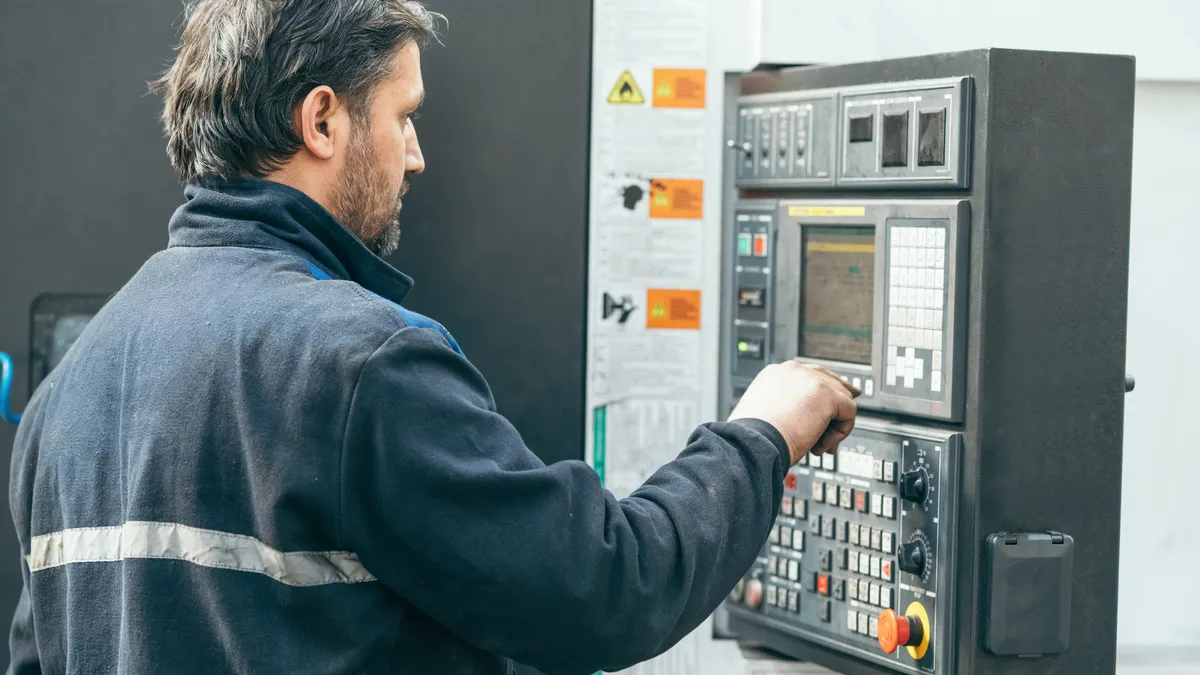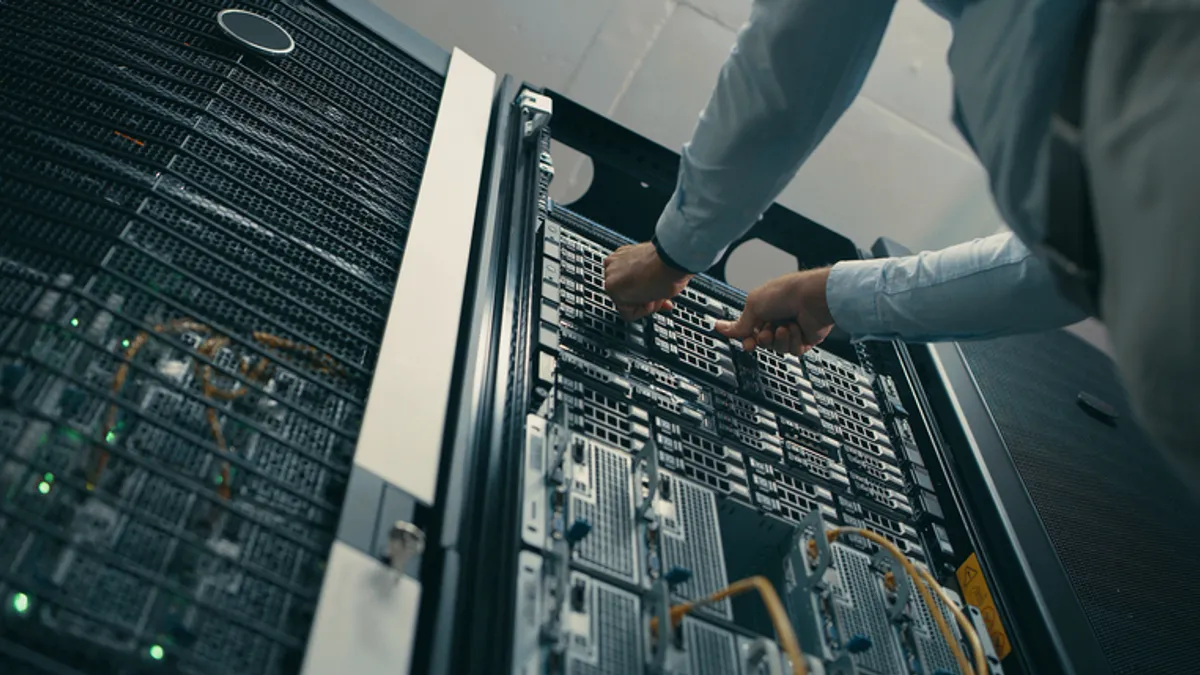In 2024, facilities managers grappled with rising operating and energy costs, demands for greater sustainability and adaptations to hybrid work.
Facilities Dive invited readers and other industry experts to share their predictions for how facilities management and their roles could change in the year ahead.
The following responses have been edited for clarity and length.
Maintenance programs will evolve as AI and automation advance
In 2025, automation and AI integration will continue to increase across the industry. One of the more prominent impacts of this will be the evolution of maintenance programs as enablers of predictive maintenance. Additionally, [companies] will continue to focus on how the workplace experience impacts workforce efficiency and employee satisfaction to maximize their real estate portfolios.
— David Bukovac, global head of integrated facilities management, Cushman & Wakefield
Return-to-office pushes will continue
The anticipated increase in return-to-office and hybrid fatigue are driving companies, particularly in the tech sector, to solidify their in-office expectations for 2025. For facilities management teams, these changes [mean they will need to adapt] workplace strategies and physical spaces to meet evolving employee needs.
— Rob Kolar, division president, technology, JLL Work Dynamics.
Office markets will stabilize and eventually improve
We're through the worst of what we have seen in office challenges. That doesn't mean that I think we are on a hockey stick curve recovery. I think it's going to take us a long time to dig out of this. Next year is going to be the start of it. I think we're going to be in a plateaued state for the first half of the year, where we're seeing good leasing activity, but we also have low deliveries to market.
We're going to continue seeing a marginal tick up. By the end of 2025, we should be talking about the fact that we are in more of a steady-state recovery, versus just the stabilization period that we're in now.
— Julie Whelan, global head of occupier thought leadership, CBRE
Generative AI will aid equipment lifecycle assessment
You'll see a lot more generative AI in the built environment. I think we're just scratching the surface of what's possible. Over time, you'll start to see generative AI take in more data … about the equipment, the average lifecycle of that equipment [and what merits] a repair versus replacement of that equipment.
— Julius Marchwicki, vice president of digital product management, Johnson Controls
Energy efficiency will be key
Efficiency will be a key focus in 2025. It's table stakes for everybody — an efficient facility is something that makes sense. The money that [you save] you can put towards something else that you want to do. I think there's a ton of opportunity to tap into that.
We waste 30% of the energy that goes into a building today. And if you look around, the building to your left is still going to be around in 2050. The building to your right might not. Fifty percent [of buildings] are still going to be here. So there's a huge opportunity for buildings right now where we're currently wasting energy.
— Tyler Haak, vice president of sustainability and services, Schneider Electric
Data will help managers optimize and predict physical space needs
We’ve all started to realize that if we work smart and [use] data, either in a physical space or screen space, we have to be able to predict. This includes not only leveraging data from virtual work [environments], but also understanding how people interact with physical spaces. I think the scrutiny [of office space utilization data] will continue until it reaches the balance point that is the most efficient. You have to continue to measure [occupancy] to get to that efficiency point, and then it will be stabilized.
— Honghao Deng, CEO, Butlr Technologies
Data centers will become modular, scalable and fully autonomous
You're going to see more modular construction and modular systems in data centers [and] across the built environment in general. The one comment that I hear often is that we can't build data centers fast enough. With modular construction, you'll see faster deployment, scalability and certification. Data centers of the future might also be fully self-operating with the use of AI-driven systems. Their cooling systems, energy management and maintenance would all be done by AI or machine learning.
— Marlee Hibbs, building science manager of technology, Armstrong World Industries
Specialized training needs and advanced training technologies will grow
As the skilled trades evolve, there will be an increasing demand for specialized and technical training. Predictive analytics, virtual simulations and hands-on experiential learning will become especially valuable [to give employees] real-world expertise in safe and controlled environments. Companies investing in diverse training modalities will build a more adaptable workforce capable of reacting to changes [and] preparing for the future in an increasingly competitive and tech-driven landscape
— Bartholomew Jae, director of education and development, National Fire Protection Association
Electric vehicle charging infrastructure will proliferate
We expect continued growth with EVs in both consumer and fleet segments. There is uncertainty [about] whether existing [federal] incentives for national infrastructure expansion, particularly the addition of public EV charging stations, will be retained. However, we expect a continuation of EV charging station installations in commercial, retail and office space as organizations aspire to achieve ESG goals.
— Eric Packer, senior vice president of strategic growth initiatives, Rexel USA
We’ll see innovation in office space utilization and lease structures
With nearly half of pre-pandemic leases unrenewed, and 1.4 billion square feet up for renewal by 2027, the trend toward smaller lease sizes and flexible commitments will shape demand, driving innovation in office space utilization and lease structures.
— David Bitner, executive managing director of global research, Newmark
Suburban mixed-use developments and coworking spaces will be in demand
Amenity-rich suburban office spaces will see strong demand in 2025, especially those integrated within diverse ecosystems — including retail, restaurants, and hospitality — as they encourage both productivity and work-life balance. Further, coworking will continue to play an essential role in meeting the needs of the modern hybrid and remote employee within office hubs.
— Ralph Zucker, CEO and founder, Inspired by Somerset Development
Budgets and staffs will need to prove their value
With less square footage to manage, facilities management teams will be expected to deliver reduced operating expenses with less head count. In this environment, FM teams and third-party suppliers alike need to be laser-focused on identifying paths to demonstrate value and, just as important, highlight their impact.
— Alex Carlson, vice president of facilities management services, Fine Tune




















